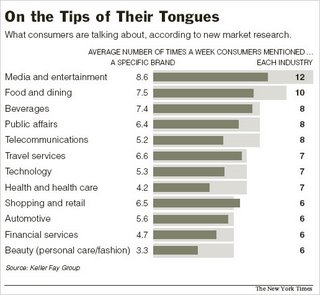It's Official, Word-Of-Mouth Is The Preferred Word-Of-Mouth Channel For Brands
 Email, Blogs, Chat Rooms, Instant Messaging, Text Messaging Take A Back Seat To Good Old "Yada, Yada, Yada"
Email, Blogs, Chat Rooms, Instant Messaging, Text Messaging Take A Back Seat To Good Old "Yada, Yada, Yada"
By David Miranda
Contrary to the notion that new channels (instant messaging, text messaging, email, chat rooms, blogs) are powerful vehicles for generating viral word-of-mouth for brands, the statistics show otherwise. A recently released study from research firm, Keller Fay, found that the overwhelming majority of conversations about brands occur offline or on the phone--72% and 17%, compared to 4% that occur on instant or text message, 3% on e-mail, and 1% in online chat rooms or blogs. In other words, consumers still overwhelming prefer to speak to one another in the old fashioned way.
According to the study, influencers or "conversation catalysts" comprise 15% of the population, but account for more than one-third of brand-related word-of-mouth. The research, based on interviews with 7,200 Americans ages 13-69, found that these influencers referenced brand names in at least 184 conversations each week, compared to 114 for non-influencers.
The above chart illustrates the average number of times per week that these influencers mentioned a specific brand and industry. The industry mentions shows the context of conversations while the brand mentions illustrates those brands who have succeeded in achieving the strongest possible WOM status, i.e. mentioned in the conversations of the influencers to those they influence.
The study also found that certain brands are more likely to be named than others - Pepsi, Coke, Target, Honda, Sony and Apple generated the highest volume of word-of-mouth conversations among all the brands discussed.
For brands, it is these influencers, or influentials, who represent the powerful "some' that brands need to engage through its marketing efforts. Yada, yada, yada.

